Peppermint and fennel ease your stomach woes thanks to their powerful natural compounds. Peppermint contains menthol, which relaxes your gut muscles and soothes inflammation. Fennel's anethole stimulates digestive enzymes and reduces stomach acid. Together, they tackle bloating, cramps, nausea, and indigestion. These herbs have been used for thousands of years across cultures for their digestive benefits. They can improve your overall gut health, strengthen your immune system, and provide long-term relief from chronic digestive issues. By incorporating these herbs into your daily routine, you'll discover a natural way to support your digestive wellness and reveal their full potential.
The Science Behind Digestive Herbs
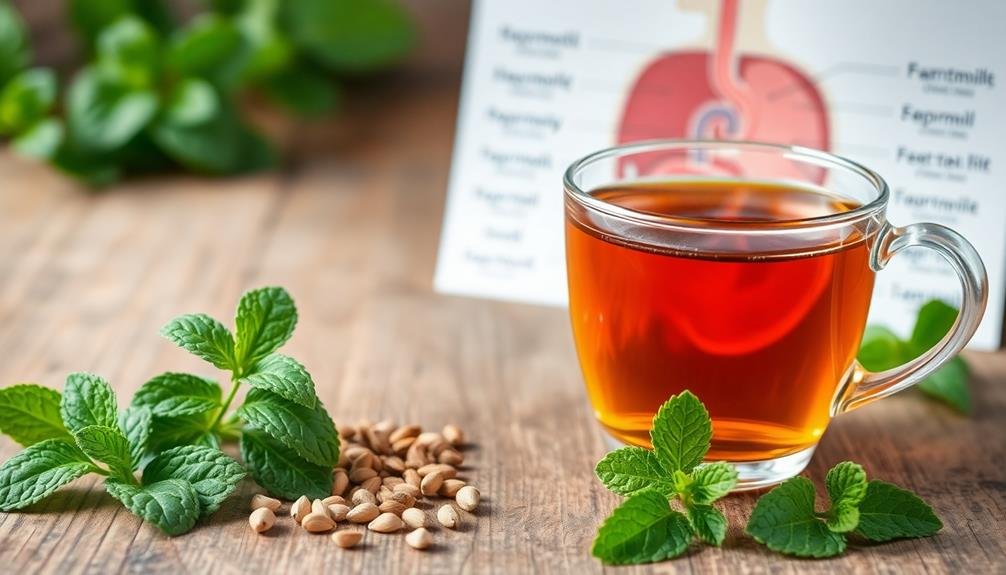
While many people turn to natural remedies for stomach issues, there's solid science behind the effectiveness of herbs like peppermint and fennel. These plants contain powerful compounds that interact with your digestive system to provide relief.
Peppermint's primary active ingredient, menthol, works by relaxing the smooth muscles in your gastrointestinal tract. This action can help alleviate symptoms of irritable bowel syndrome (IBS) and reduce bloating.
Fennel, on the other hand, contains anethole, a compound that stimulates the production of digestive enzymes. This helps break down food more efficiently, reducing gas and indigestion.
Both herbs also possess antispasmodic properties, which can ease stomach cramps and nausea.
Research has shown that peppermint oil capsules can considerably reduce IBS symptoms, while fennel tea has been found to decrease bloating and stomach pain.
The anti-inflammatory properties of these herbs further contribute to their digestive benefits. By reducing inflammation in the gut, they can help soothe various gastrointestinal issues.
When you consume these herbs, you're not just following an old wives' tale – you're tapping into nature's pharmacy, backed by scientific evidence.
Peppermint's Calming Properties
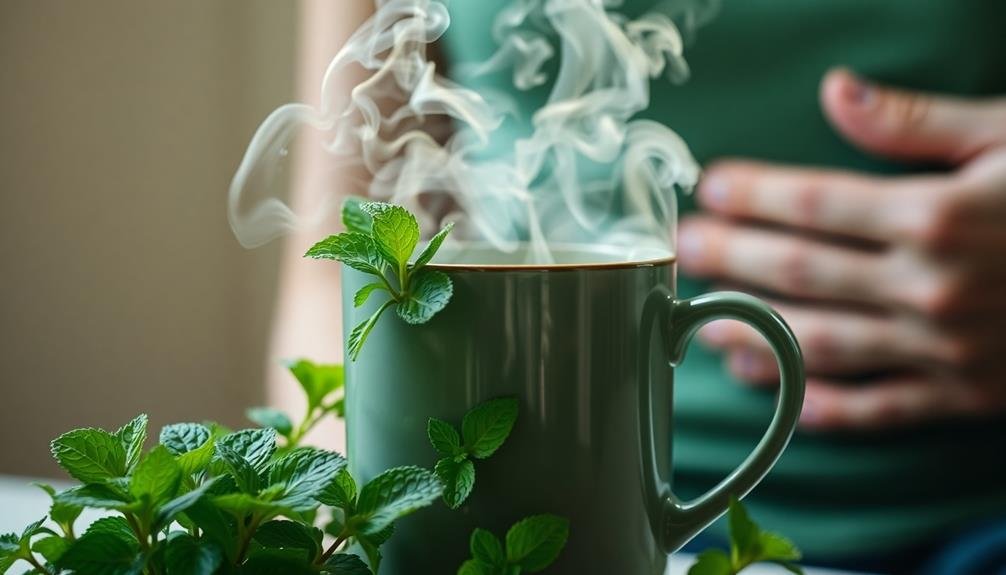
Peppermint's soothing effects on your stomach stem from its active compound, menthol.
You'll find that menthol relaxes the smooth muscles in your digestive tract, easing cramps and discomfort.
This muscle-relaxing action also helps reduce bloating by allowing trapped gas to move more freely through your system.
Muscle-Relaxing Menthol Effects
Menthol, the primary compound in peppermint, is renowned for its muscle-relaxing properties. When you consume peppermint, either as tea or in oil form, menthol interacts with smooth muscle tissue in your digestive tract. This interaction causes the muscles to relax, which can greatly reduce spasms and cramps in your stomach and intestines.
You'll find that menthol's effects extend beyond just muscle relaxation. It also has a cooling sensation that can help soothe inflammation in your digestive system. This dual action of relaxation and cooling makes peppermint particularly effective for conditions like irritable bowel syndrome (IBS) and indigestion.
The muscle-relaxing effects of menthol aren't limited to your digestive system. It can also help relax muscles in your esophagus, potentially easing symptoms of acid reflux. However, if you suffer from chronic heartburn, you should use peppermint cautiously, as it may sometimes worsen symptoms by relaxing the lower esophageal sphincter.
When you're experiencing stomach discomfort, reaching for peppermint can provide quick relief. Its natural muscle-relaxing properties make it a safe and effective option for many digestive issues.
Digestive Gas Reduction
A cup of peppermint tea can be your ally in the battle against digestive gas. Peppermint's natural compounds, particularly menthol, work to relax your digestive tract's smooth muscles. This relaxation helps alleviate bloating and allows trapped gas to move more freely through your system, reducing discomfort.
When you consume peppermint, it stimulates the production of bile, which aids in the breakdown of fats. This improved digestion can lead to less gas formation in your intestines. Additionally, peppermint has carminative properties, meaning it helps expel gas from your stomach and intestines, providing quick relief from bloating and flatulence.
Peppermint's antispasmodic effects also play a role in gas reduction. By calming intestinal spasms, it prevents the buildup of gas pockets that can cause pain and bloating. You'll find that regular consumption of peppermint tea or supplements can help regulate your digestive system, potentially reducing the frequency and severity of gas-related issues.
While peppermint is generally safe, it's crucial to recognize that it may worsen symptoms for those with gastroesophageal reflux disease (GERD). If you have GERD, consult your healthcare provider before incorporating peppermint into your diet.
Fennel's Soothing Effects
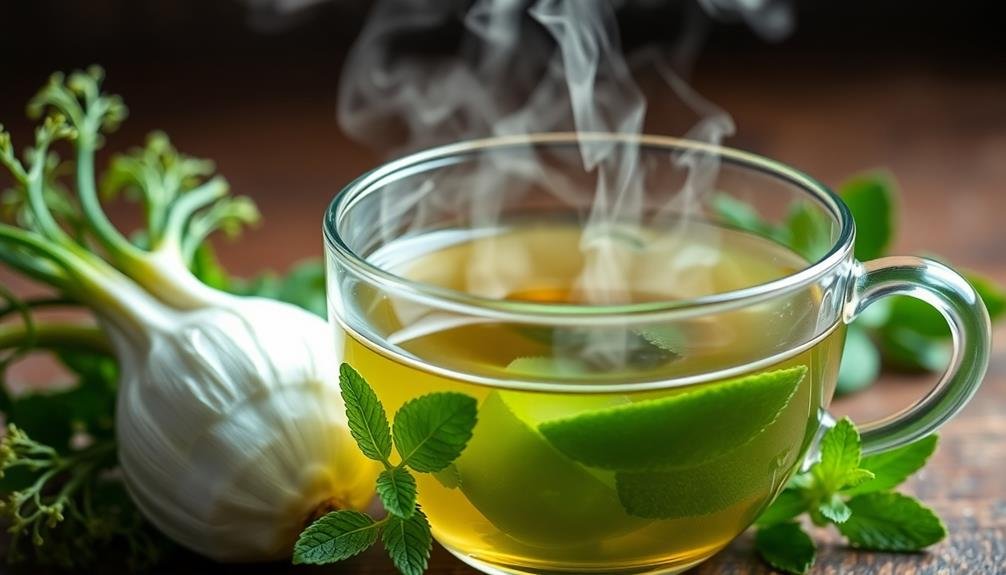
Fennel seeds, with their sweet licorice-like flavor, offer more than just culinary appeal. They're packed with compounds that can soothe your digestive system and alleviate various stomach issues.
When you consume fennel, you're tapping into its natural antispasmodic properties, which help relax the smooth muscles in your digestive tract. This relaxation effect can ease cramping, bloating, and general discomfort.
Fennel also stimulates the production of gastric juices, aiding in the breakdown of food and improving overall digestion. If you're prone to indigestion or acid reflux, fennel's ability to reduce stomach acid production might provide relief.
You'll find that fennel can be particularly helpful after heavy meals. It's known to speed up digestion and reduce the feeling of fullness.
For those dealing with irritable bowel syndrome (IBS), fennel's anti-inflammatory properties may offer some respite from symptoms. You can enjoy fennel's benefits by chewing on the seeds, brewing them into a tea, or using fennel essential oil.
Regular consumption might even contribute to long-term digestive health, making it a valuable addition to your dietary routine.
Synergy of Peppermint and Fennel
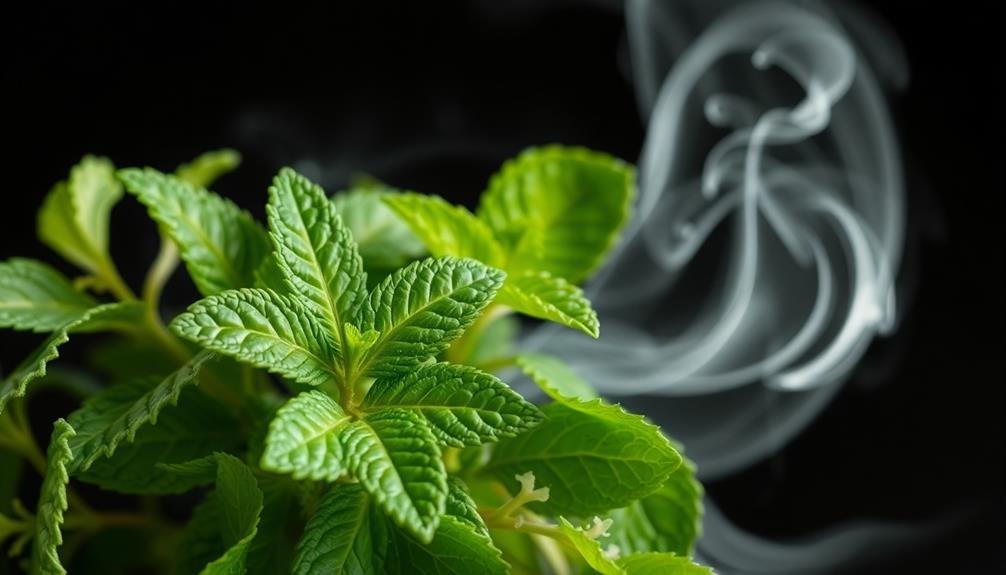
While both peppermint and fennel offer impressive benefits individually, their combined power creates a potent remedy for digestive issues. When you pair these two herbs, you're tapping into a synergistic effect that amplifies their stomach-soothing properties.
Peppermint's menthol and fennel's anethole work together to relax your digestive tract muscles, reducing spasms and alleviating cramps. This dual action helps ease bloating, gas, and indigestion more effectively than either herb alone.
You'll also benefit from their combined anti-inflammatory properties, which can calm irritated stomach lining and reduce discomfort.
The aromatic compounds in both herbs stimulate digestive enzymes, enhancing your body's ability to break down food and absorb nutrients. This improved digestion can lead to less stomach upset and fewer instances of acid reflux.
Additionally, the antioxidants in peppermint and fennel work in tandem to protect your digestive system from oxidative stress and support overall gut health.
Ancient Uses of These Herbs
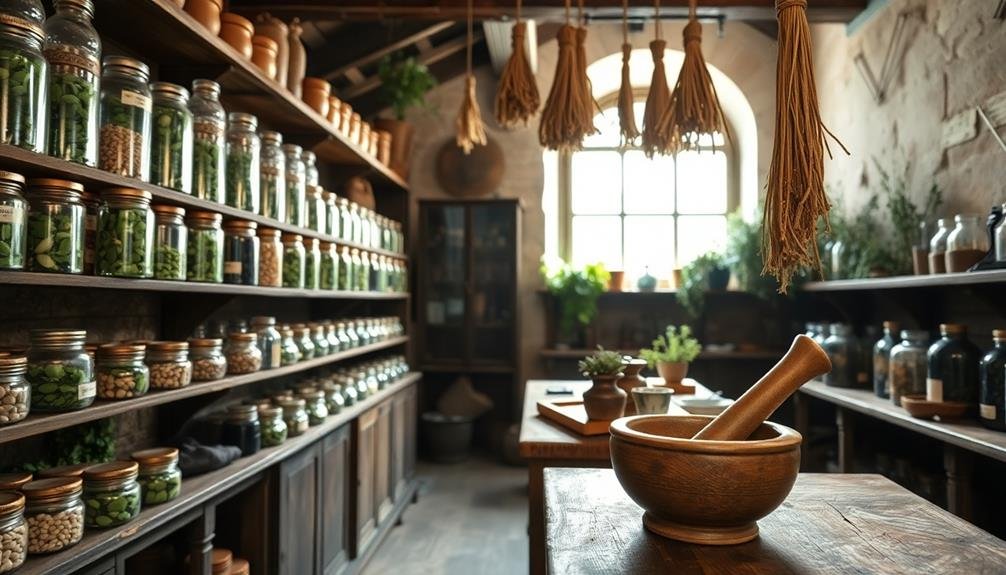
You'll find that peppermint and fennel have been used medicinally for thousands of years across various cultures.
These herbs were prized not only for their digestive benefits but also for their spiritual and symbolic significance in ancient societies.
From Egyptian tombs to Greek mythology, peppermint and fennel have played important roles in traditional medicine and cultural practices throughout history.
Traditional Medicinal Applications
Throughout history, peppermint and fennel have been prized for their medicinal properties. You'll find that traditional healers have long relied on these herbs to treat various digestive issues.
Peppermint has been used to soothe upset stomachs, reduce nausea, and alleviate gas and bloating. It's also been employed to relieve headaches and promote relaxation.
Fennel, on the other hand, has been a go-to remedy for indigestion, flatulence, and stomach cramps. You might be surprised to learn that it's also been used to increase milk production in nursing mothers and to ease menstrual discomfort.
In traditional Chinese medicine, you'll discover that peppermint is believed to disperse "liver qi stagnation," which is thought to cause various digestive problems.
Fennel is considered a warming herb that can strengthen the spleen and stomach.
Ayurvedic practitioners have used peppermint to balance the Pitta dosha, associated with digestion and metabolism.
They've also recommended fennel to improve digestion and reduce bloating.
You'll find that European folk medicine has employed these herbs in teas, tinctures, and poultices to treat a wide range of digestive complaints, showcasing their enduring popularity in traditional healing practices.
Historical Cultural Significance
The ancient uses of peppermint and fennel extend far beyond their medicinal applications, deeply rooting these herbs in various cultures worldwide.
You'll find these herbs woven into the fabric of ancient civilizations, from religious ceremonies to culinary traditions.
Peppermint, with its invigorating aroma, has been revered since ancient times. The Greeks and Romans used it to flavor wines and adorn their tables during feasts.
In Egypt, dried peppermint leaves were found in pyramids dating back to 1000 BCE, suggesting its importance in burial rituals.
Fennel's cultural significance is equally impressive. The ancient Greeks associated it with knowledge and longevity.
Roman warriors ate fennel seeds to boost their strength before battle.
Here's a quick look at some fascinating historical uses:
- Ancient Greeks used fennel as a slimming aid
- Medieval Europeans hung fennel over doorways to ward off evil spirits
- Puritans chewed fennel seeds during long church services to stave off hunger
- Chinese used peppermint in feng shui practices to attract wealth and prosperity
These historical uses highlight how deeply ingrained peppermint and fennel have been in human culture, transcending their roles as mere medicinal herbs.
Modern Research on Digestive Health
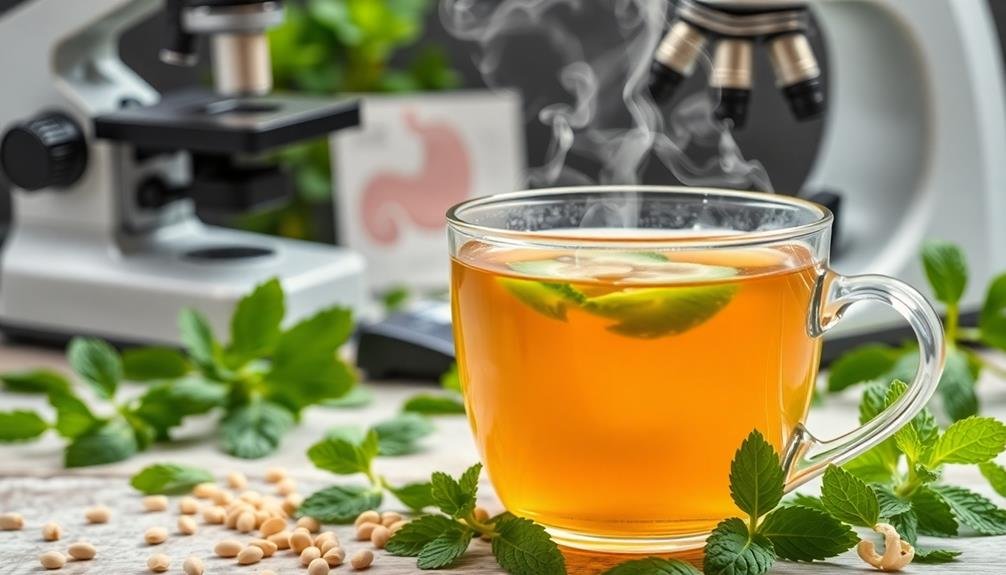
In recent years, scientific research has shed new light on the traditional use of peppermint and fennel for digestive issues. Studies have shown that peppermint oil can effectively reduce symptoms of irritable bowel syndrome (IBS), including abdominal pain, bloating, and gas. Its active compound, menthol, relaxes smooth muscles in your digestive tract, easing spasms and discomfort.
Fennel seeds have also been found to possess potent antispasmodic and carminative properties. Research indicates that they can help alleviate indigestion, reduce flatulence, and promote overall gut health. The compound anethole in fennel has demonstrated anti-inflammatory effects, potentially benefiting those with digestive inflammation.
You'll find that both herbs have been studied for their potential to improve digestion and reduce nausea. Peppermint's cooling effect may help soothe an upset stomach, while fennel's mild licorice flavor can stimulate digestion and reduce bloating.
Clinical trials have even explored their use in treating functional dyspepsia and infant colic. While more research is needed to fully understand their mechanisms, current evidence supports the traditional use of peppermint and fennel for various digestive complaints.
Always consult your healthcare provider before using these herbs medicinally.
Preparing Your Herbal Tea Blend
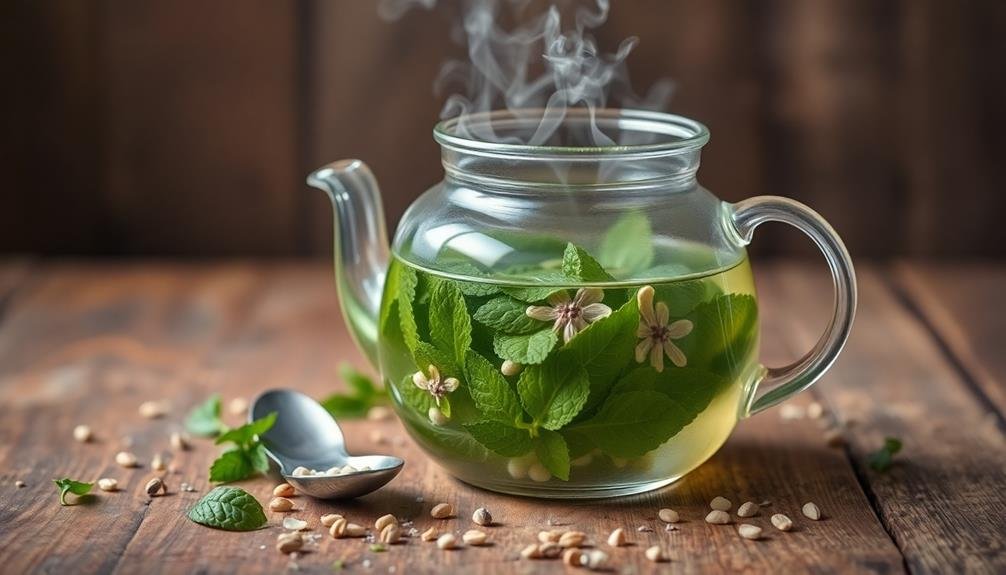
When you're ready to prepare your peppermint and fennel tea blend, it's essential to measure your ingredients accurately for the best results.
You'll want to pay close attention to the steeping time, as it greatly affects the tea's flavor and potency.
Once your tea has steeped, proper straining and serving techniques will guarantee you enjoy a smooth, debris-free cup of herbal goodness.
Measuring Ingredients Correctly
Precision is key when measuring ingredients for your peppermint and fennel tea blend.
You'll want to guarantee you're getting the right balance of flavors and therapeutic properties. Using too much of one herb can overpower the other or potentially cause adverse effects. To measure accurately, invest in a small digital scale that can weigh in grams. This will give you the most precise measurements for your herbs.
When creating your blend, follow these guidelines:
- Start with a 1:1 ratio of peppermint to fennel seeds
- Use 1-2 teaspoons of the blend per cup of hot water
- Adjust the ratio based on your taste preferences
- Don't exceed 3-4 cups of this tea blend per day
Remember that dried herbs are more concentrated than fresh ones, so you'll need less if using dried peppermint leaves.
If you're using fresh herbs, roughly double the amount. Store your measured blend in an airtight container away from light and heat to preserve its potency.
Steeping Time Matters
Now that you've carefully measured your herbs, it's time to focus on proper steeping techniques. Steeping time is essential for extracting the ideal flavor and beneficial compounds from peppermint and fennel. For these herbs, aim for a steeping time of 5 to 10 minutes in hot water.
Use water that's just below boiling point, around 200°F (93°C), to avoid scorching the delicate leaves and seeds. This temperature helps release the essential oils without making the tea bitter. Cover your cup or teapot while steeping to prevent the volatile oils from escaping.
Don't rush the process; steeping for too short a time won't allow the herbs to release their full potential. However, steeping for too long can result in a bitter taste, especially with peppermint. If you prefer a stronger flavor, add more herbs rather than extending the steeping time.
After steeping, strain the herbs and enjoy your tea immediately for the best flavor and health benefits. You can drink it hot or let it cool for a revitalizing iced tea.
Straining and Serving Techniques
Once your peppermint and fennel tea has steeped to perfection, it's time to strain and serve. Use a fine-mesh strainer or a tea infuser to separate the herbs from the liquid, ensuring a smooth and debris-free beverage.
Pour the tea into your favorite mug or teacup, allowing the soothing aroma to envelop your senses.
For ideal enjoyment and health benefits, consider these serving techniques:
- Temperature control: Let the tea cool slightly before drinking to preserve its beneficial compounds and avoid burning your tongue.
- Honey addition: If desired, stir in a teaspoon of raw honey for added sweetness and potential antibacterial properties.
- Lemon twist: Squeeze a few drops of fresh lemon juice to enhance the flavor and boost vitamin C content.
- Iced option: Pour the strained tea over ice for a revitalizing cold remedy on hot days.
Optimal Ratios for Maximum Benefits

Finding the sweet spot between peppermint and fennel can make all the difference in soothing your stomach woes. While both herbs offer digestive benefits, combining them in the right proportions can amplify their effects. A general rule of thumb is to use a 2:1 ratio of peppermint to fennel. This balance allows the cooling properties of peppermint to dominate while the fennel provides a gentle, sweet undertone.
For a standard cup of tea, you'll want to use about 1 teaspoon of dried peppermint leaves and 1/2 teaspoon of crushed fennel seeds. If you're using fresh herbs, increase the amounts to 1 tablespoon of peppermint leaves and 1 1/2 teaspoons of crushed fennel seeds.
Remember, these ratios aren't set in stone. You can adjust them based on your personal taste preferences and the severity of your digestive issues. If you find the peppermint too strong, reduce it slightly and increase the fennel. Conversely, if you need more potent relief, you can increase the peppermint proportion.
Experiment with different ratios to find what works best for your unique needs.
Best Times to Consume
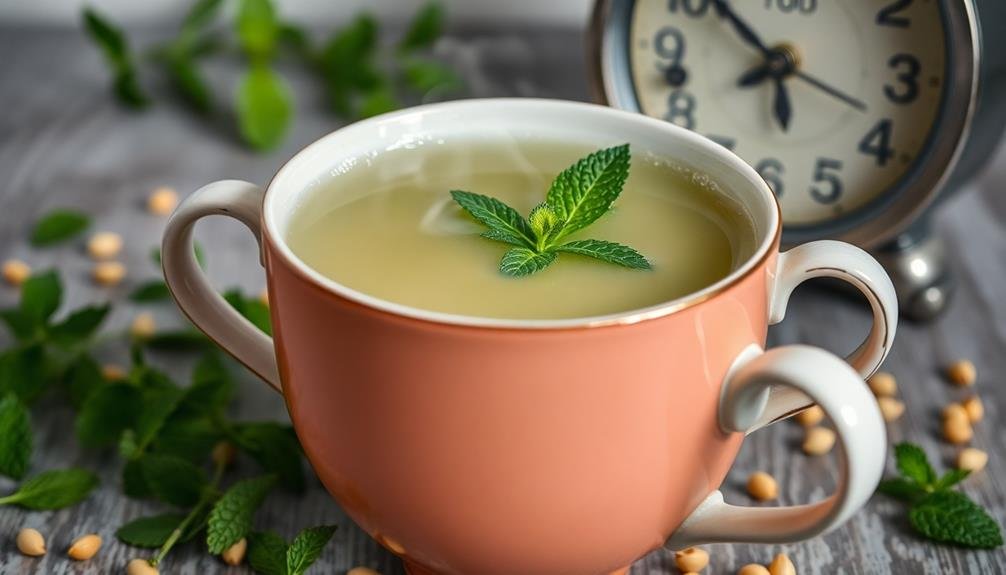
When should you reach for that soothing blend of peppermint and fennel? Timing can make a significant difference in how effectively these herbs alleviate your stomach discomfort. You'll want to consume this combination strategically to maximize its benefits.
For best results, consider these key times to enjoy your peppermint and fennel remedy:
- 15-30 minutes before meals: This helps prepare your digestive system and can reduce the likelihood of indigestion or bloating after eating.
- 1-2 hours after meals: If you're prone to post-meal discomfort, this timing can help ease symptoms and promote better digestion.
- Before bedtime: A cup of peppermint and fennel tea can calm your stomach and potentially improve sleep quality.
- During periods of stress: These herbs can help soothe stress-induced stomach issues.
Potential Side Effects
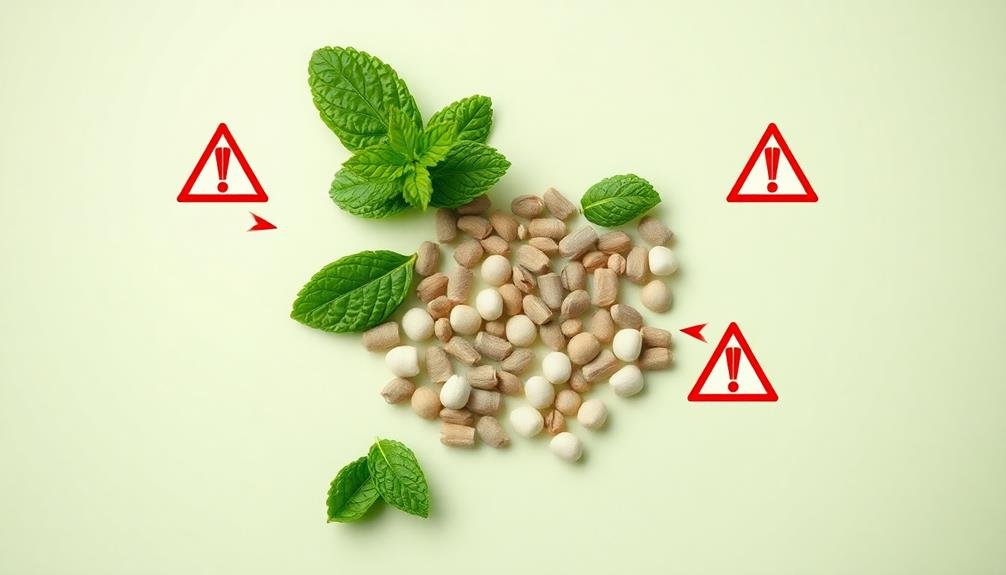
While peppermint and fennel can be soothing for many, you should be aware of potential side effects.
You might experience allergic reactions or heartburn, especially if you're prone to acid reflux.
It's essential to consult your doctor about possible drug interactions before incorporating these herbs into your routine, particularly if you're on medication.
Allergic Reactions Possible
A small number of people may experience allergic reactions to peppermint or fennel. While these herbs are generally safe for most individuals, it's important to be aware of potential allergic responses.
If you're allergic to plants in the Lamiaceae family (mint family) or Apiaceae family (parsley family), you might be more susceptible to reactions from peppermint or fennel, respectively.
Watch out for these common signs of an allergic reaction:
- Skin rashes or hives
- Itching or swelling of the mouth, lips, or throat
- Difficulty breathing or wheezing
- Nausea, vomiting, or abdominal pain
If you experience any of these symptoms after consuming peppermint or fennel, stop using them immediately and consult your healthcare provider.
It's vital to identify any allergies before regularly incorporating these herbs into your diet. In rare cases, severe allergic reactions (anaphylaxis) can occur, which require immediate medical attention.
If you have a known allergy to either herb, avoid using it and seek alternative remedies for stomach issues. Always inform your doctor about any herbal supplements you're taking to guarantee they don't interfere with your current medications or health conditions.
Heartburn in Some
Peppermint and fennel, despite their stomach-soothing properties, can ironically cause heartburn in some individuals. If you're prone to acid reflux or gastroesophageal reflux disease (GERD), you might experience increased discomfort after consuming these herbs. Peppermint can relax the lower esophageal sphincter, allowing stomach acid to flow back into the esophagus. Fennel, while less likely to cause heartburn, may still trigger symptoms in sensitive individuals.
To help you understand the potential effects, consider this comparison:
| Herb | Benefits | Risks |
|---|---|---|
| Peppermint | Relieves bloating | May worsen heartburn |
| Fennel | Reduces gas | Possible mild heartburn |
| Ginger | Eases nausea | Generally safe alternative |
If you notice increased heartburn after consuming peppermint or fennel, try reducing your intake or switching to alternative remedies. Ginger, for example, offers similar digestive benefits without the risk of exacerbating acid reflux. You can also try consuming these herbs in smaller amounts or with food to minimize their impact on your esophageal sphincter. Remember, everyone's digestive system is unique, so what works for others may not work for you. If you continue to experience persistent heartburn, consult your healthcare provider for personalized advice.
Drug Interactions Concern
Herbs' reputation for being natural and safe can lead to overlooking potential drug interactions. When using peppermint or fennel for stomach relief, you should be aware of possible interactions with medications you're taking.
These herbs can affect how your body processes certain drugs, potentially altering their effectiveness or causing unwanted side effects.
If you're considering using peppermint or fennel supplements, consult your healthcare provider first, especially if you're on prescription medications. They'll help you understand potential risks and adjust your treatment plan if necessary.
Be particularly cautious if you're taking:
- Blood thinners
- Diabetes medications
- Antacids or acid reflux drugs
- Certain antibiotics
Other Complementary Herbs
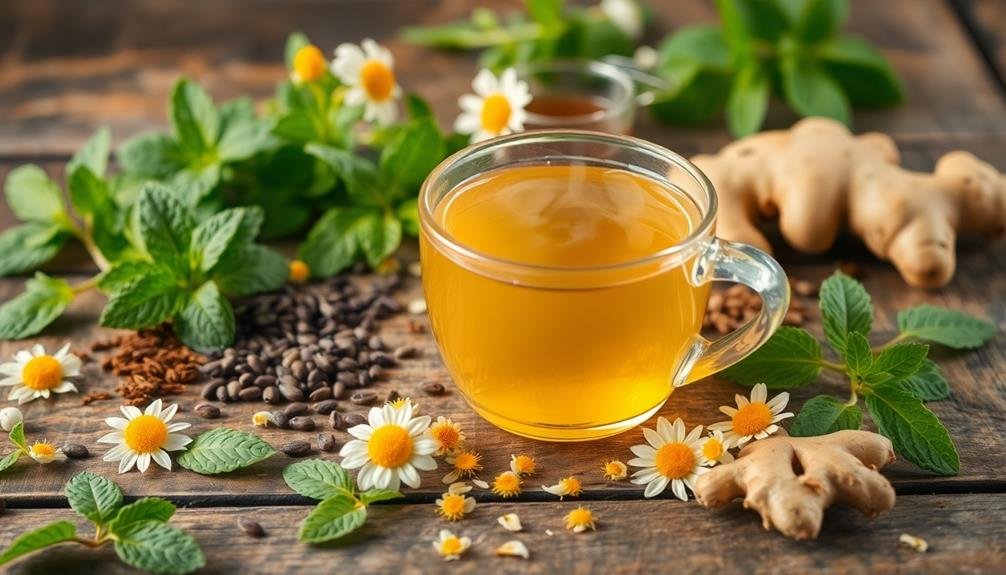
While peppermint and fennel are popular choices for digestive relief, several other herbs can complement their effects. You might want to take into account ginger, which has been used for centuries to ease nausea and reduce inflammation in the digestive tract. It's especially effective for motion sickness and pregnancy-related nausea.
Another herb to try is chamomile, known for its calming properties. It can help soothe an upset stomach and relieve indigestion. Chamomile tea is a gentle, caffeine-free option that you can enjoy throughout the day.
Licorice root is another powerful herb that can help with acid reflux and stomach ulcers. However, you should use it cautiously, as it can raise blood pressure in some people.
Don't overlook the benefits of slippery elm bark. It forms a protective coating in your digestive tract, which can help alleviate heartburn and other digestive discomforts.
Lastly, think about adding marshmallow root to your herbal arsenal. It's known for its ability to soothe irritated mucous membranes in the digestive system, potentially easing symptoms of inflammatory bowel conditions.
Storing Your Herbal Blend
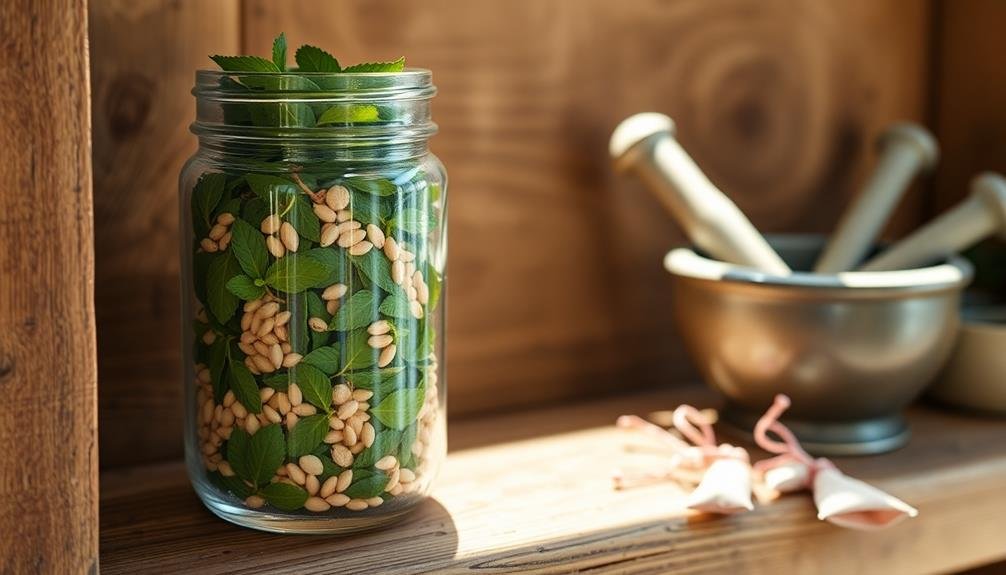
Once you've assembled your herbal blend, proper storage is key to maintaining its potency and freshness. Your peppermint and fennel mixture will stay at its best when you keep it in an airtight container, away from direct sunlight and heat. Glass jars with tight-fitting lids or resealable bags designed for herbs work well.
Store your blend in a cool, dry place like a kitchen cabinet or pantry.
To guarantee your herbal blend remains effective and safe to use, follow these storage tips:
- Label your container with the blend's contents and date of preparation
- Check for moisture regularly and discard if any signs of mold appear
- Use within 6-12 months for peak potency
- Keep away from strong-smelling foods to prevent absorption of other odors
Remember that dried herbs can lose their potency over time, so it's best to make smaller batches that you'll use within a few months.
If you notice the aroma of your blend has weakened considerably, it's time to make a fresh batch. By storing your peppermint and fennel blend properly, you'll always have an effective remedy on hand for stomach discomfort.
Flavor Variations to Try
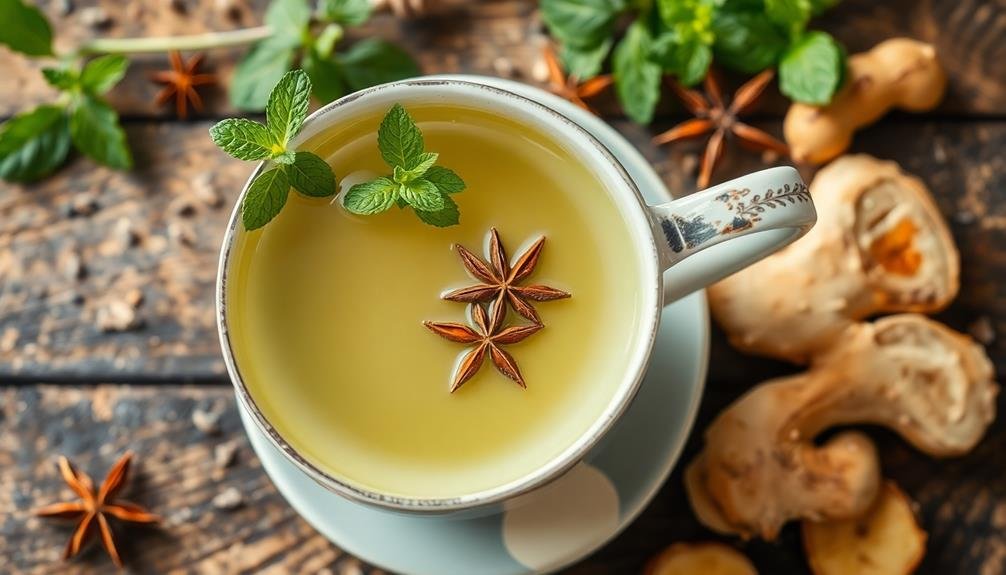
Occasionally, you might want to experiment with different flavors to complement or enhance your peppermint and fennel blend. Adding a touch of ginger can intensify the digestive benefits while providing a warm, spicy kick.
Try incorporating dried ginger root or a small amount of powdered ginger into your mixture.
For a sweeter profile, consider adding a hint of licorice root. It's naturally sweet and can help soothe the stomach lining.
If you're looking for a citrusy twist, dried lemon balm or lemon verbena can brighten up the flavor and add a revitalizing note.
Chamomile is another excellent addition, known for its calming properties. It pairs well with peppermint and fennel, creating a more relaxing blend.
For those who enjoy earthy flavors, a small amount of dried dandelion root can add depth to your tea while supporting liver function.
If you're feeling adventurous, try adding a pinch of cinnamon or cardamom. These warming spices can enhance the overall flavor profile and provide additional digestive support.
Remember to start with small amounts of any new ingredients and adjust to your taste preferences.
Long-Term Benefits of Regular Consumption
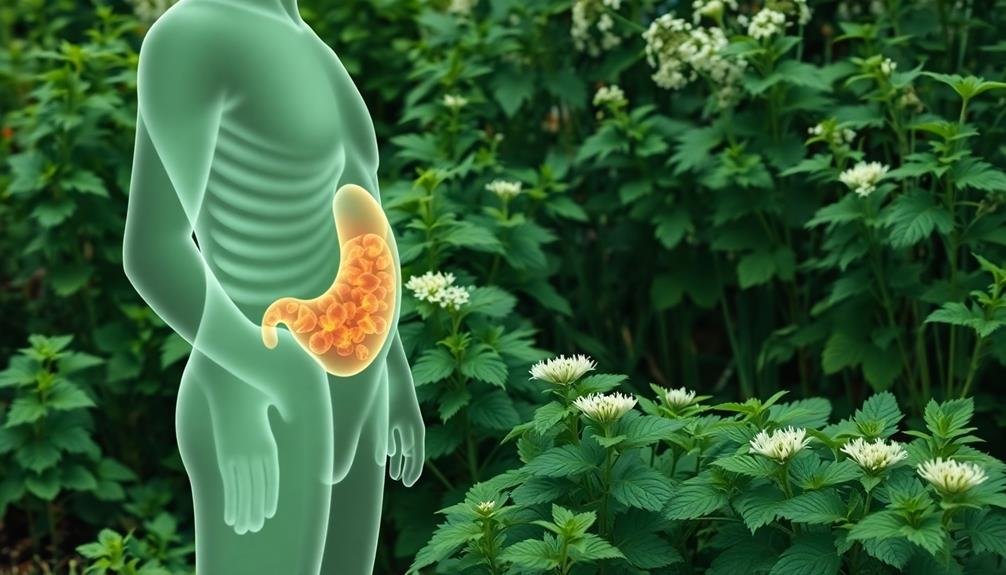
Beyond the immediate relief peppermint and fennel can provide for stomach issues, regular consumption of these herbs offers long-term benefits for your digestive health.
By incorporating these natural remedies into your daily routine, you'll support your gut's overall function and potentially prevent future digestive problems.
Here are four long-term benefits of regularly consuming peppermint and fennel:
- Improved digestion: These herbs enhance the production of digestive enzymes, promoting better nutrient absorption and reducing the likelihood of indigestion.
- Reduced inflammation: Their anti-inflammatory properties can help soothe chronic digestive issues like IBS and GERD over time.
- Enhanced gut microbiome: Regular consumption may support a healthier balance of beneficial gut bacteria, improving overall digestive health.
- Strengthened immune system: A healthier gut contributes to a stronger immune system, potentially reducing your susceptibility to various illnesses.
Frequently Asked Questions
Can Pregnant Women Safely Consume Peppermint and Fennel for Digestive Relief?
You should consult your doctor before using peppermint or fennel during pregnancy. While they're generally considered safe, some women may need to avoid them. Your healthcare provider can offer personalized advice based on your specific situation.
How Do Peppermint and Fennel Compare to Over-The-Counter Antacids?
You'll find peppermint and fennel offer natural, gentle relief compared to antacids. They work differently, soothing your digestive system rather than neutralizing acid. However, antacids may provide faster, more targeted relief for severe heartburn or indigestion.
Are There Any Known Drug Interactions With Peppermint or Fennel?
You should be aware of potential interactions between peppermint and certain medications. It can affect the absorption of some drugs. Fennel may interact with estrogen-sensitive medications. Always consult your doctor before combining herbs with prescriptions.
Can Children Use Peppermint and Fennel for Stomach Issues?
You can use peppermint and fennel for children's stomach issues, but be cautious. They're generally safe in small amounts, but consult a pediatrician first. For infants, avoid peppermint and use diluted fennel tea only under medical guidance.
Do Peppermint and Fennel Teas Have Any Effect on Weight Loss?
You might find peppermint and fennel teas helpful for weight loss. They can boost metabolism, reduce appetite, and aid digestion. However, they're not miracle cures. Combine them with a balanced diet and exercise for best results.
In Summary
You've discovered the power of peppermint and fennel for your digestive health. By incorporating these herbs into your routine, you're tapping into centuries-old wisdom backed by modern science. Remember, they're not just for stomachaches; they can contribute to your overall well-being. Experiment with different blends and preparations to find what works best for you. With regular use, you'll likely notice improved digestion and a happier gut. Don't hesitate to explore other complementary herbs too!

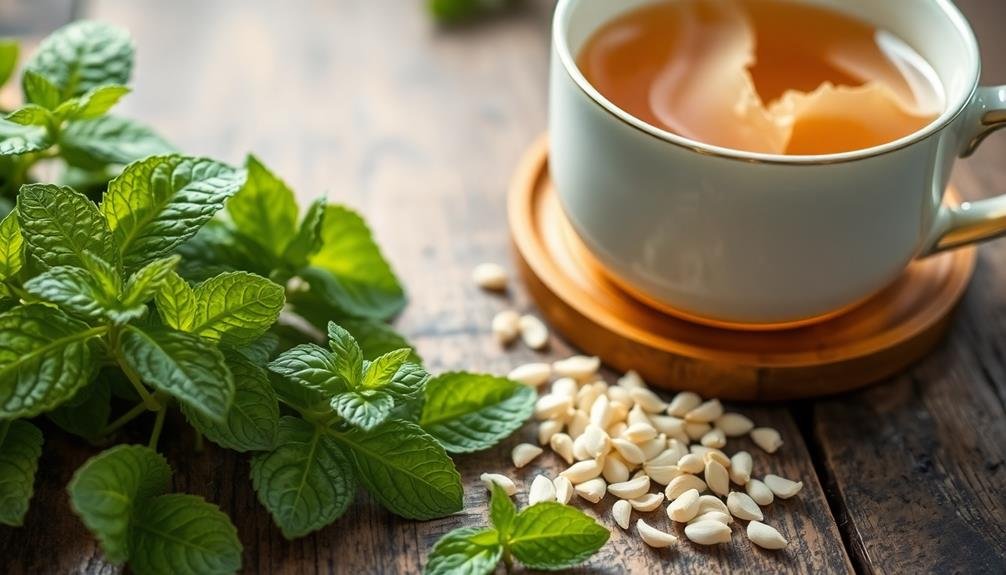


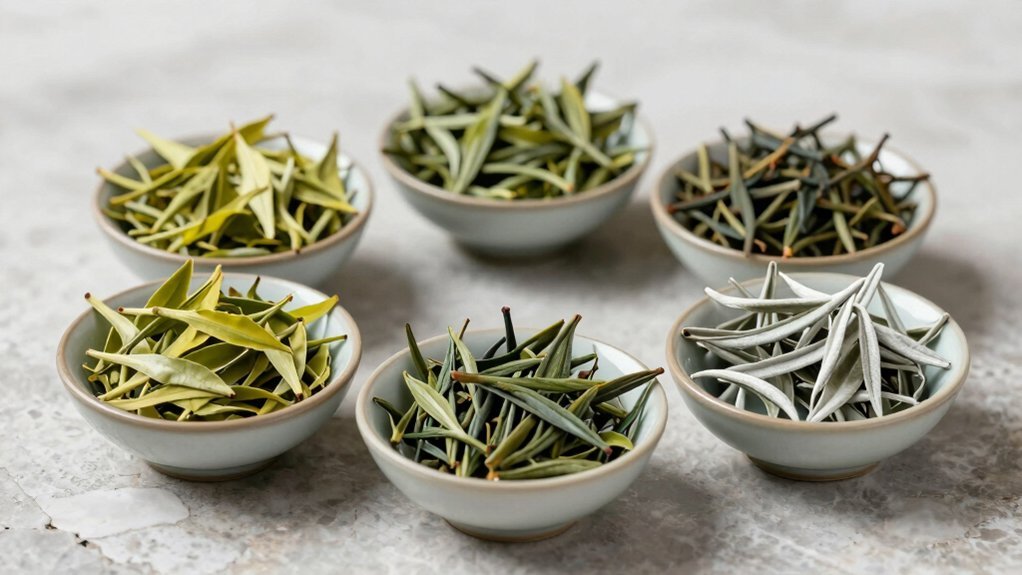
Leave a Reply